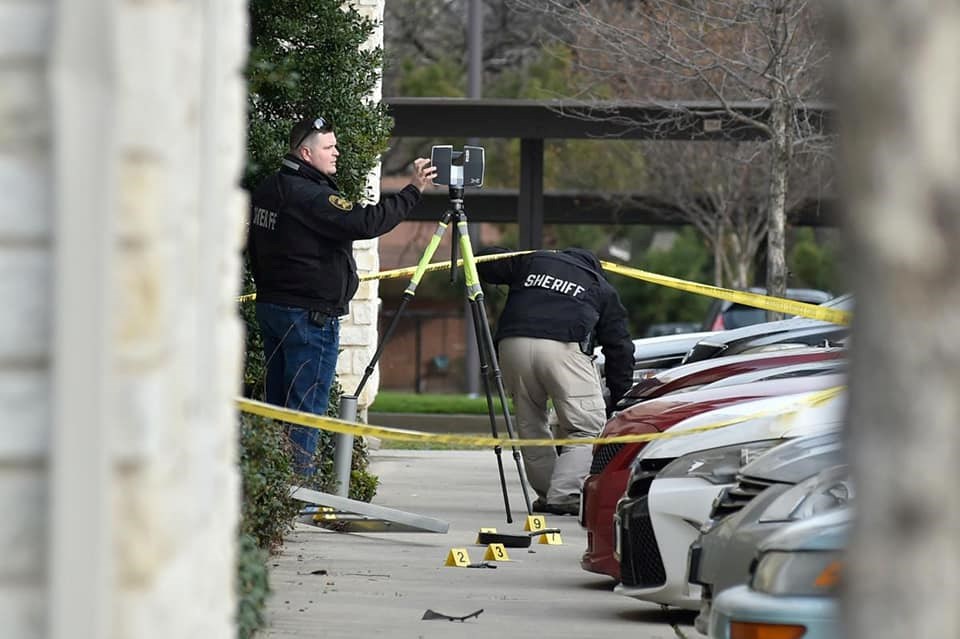One of the last times Kevin Tarver, Sr., recalls speaking with his son, they were standing together in front of what was left of his son’s red four-door Kia Spectra sedan. The mangled mess in front of them looked more like a crushed aluminum can than the pride and joy of his son who bought the car with the money he made working two jobs while attending school. The front tires were deflated and the hood was mashed in like an accordion. Splotches of mud encased parts of the vehicle and the back window was busted out. The airbags were deployed and bloodied, and the top of the car was dented over the shattered front windshield.
"Look at that car," Tarver told his son. “What are the odds you survived that?”
Tarver's son leaned in through one of the twisted doors to see what personal effects he could salvage from inside the car. He seemed tired. His head was still swollen along a line of fresh stitches. The dark shades he was wearing concealed some of the scratches and bruising on his face. A slight grimace revealed a chipped tooth.
It was a January afternoon, a couple of days before the start of the spring semester and just six days after Darius "DJ" Tarver was involved in a rollover accident in Denton. It took first responders two hours to cut him out of his crumpled car as he lay unresponsive at the scene. He didn’t remember much about what happened.
But his father certainly can’t forget the two phone calls he missed before calling back to get the horrible news. It had been snowing and sleeting. He jumped in his car and drove through the ice and rain, passing other accidents along the way to find Darius at a Denton hospital, surrounded in a maze of tubes for breathing support. His son was heavily sedated and coming in and out of consciousness but “never in his right mind even so far as being on restraints,” his father wrote in a Jan. 13 Facebook post.
“It’s (hard to describe) your child laying there helpless,” he wrote. “I routinely pray for my family and children daily. Continue keeping DJ in prayer as he continues to recover so he can complete his last semester of college.”
DJ was released after just one day in intensive care. Typically, patients with such traumatic injuries stay much longer to recover. He returned to school several days later.
Tarver was happy his son was home. But he didn’t seem the same. He just thought he was tired and his mind was on getting through his final semester. “Son, there’s a reason you came out of that accident alive,” he told his son at dinner that night. “Give it all you’ve got as you get better. Give it to God.”
Tarver, Sr., is a church pastor and chaplain for the McKinney police department. As chaplain, it's his job is to talk with victims of accidents and crimes. This time it’s more personal.
“There are great things waiting for you,” he says.
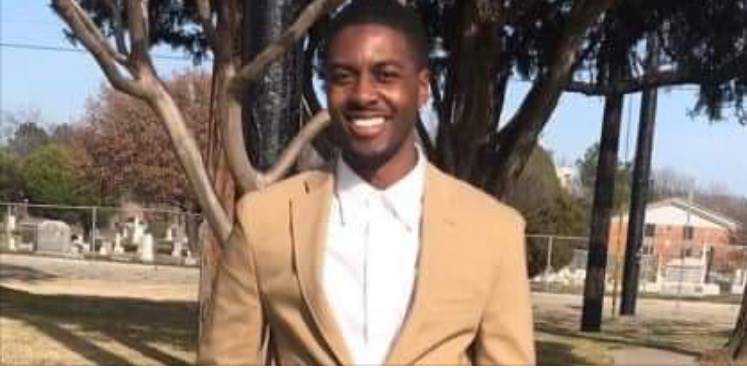
DJ was already accomplishing great things. He was a senior majoring in criminal justice at the University of North Texas. Following in his father’s footsteps, he too planned to work in law enforcement. He received his Police Emergency Dispatch Certification during his senior year at McKinney High School. He attended Tyler Junior College, where he earned an associate of arts degree in liberal studies in 2017. He was on the dean’s list and he had been talking to several police academies as he had just a few months left to finish his degree.
That Sunday, heeding his father’s words, DJ walked to the front of his church, a fresh cut still visible on his right cheek, and proclaimed that he was giving himself to God. DJ—who Tarver, Sr. could hardly get to pray over the food at Thanksgiving, as his father put it—planned to be baptized in February.
Two days after that church service, DJ was dead, killed by Denton police. He was just 23.
He would have graduated this May.
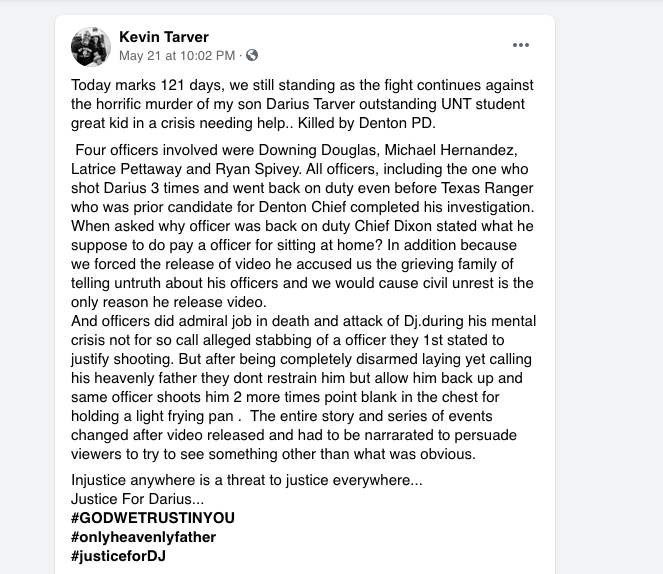
In the months after the shooting, Tarver has been looking for ways to bring justice for his son. He participated in a protest in front of the Denton police station demanding that police release the body cam footage of the shooting. UNT students and citizens held a sit-in at city hall. Tarver shared his story with local and national newspapers, and appeared on radio and television stations. A city council member from Denton, Deborah "Deb" Armintor, and a council member in neighboring McKinney, La'Shadion Shemwell, joined Tarver's call for justice.
The footage was finally released to the public in March, more than a month after the shooting. But the family struck back saying the footage tells a different story than the official narrative. They held press conferences. DJ’s parents and brother and other family members sat shoulder to shoulder, some holding hands, in a pew at Mount Calvary Baptist Church in Denton when citizens gathered in a town hall meeting to confront the police chief with questions they had.
Tarver wants the officer who shot his son (the officer is still on the force) to be charged criminally in Darius’ death. He was setting up a time to meet with the Denton County District Attorney’s Office to discuss the case when COVID-19 hit in mid March.
The lockdown stopped the movement in its tracks. The DA’s office paused cases. Courts shut down. Unrelenting, some citizens are encouraging others to call the DA’s office to demand justice in the shooting of the young black man by a white police officer. They want to make sure the style of presentation by the Denton police chief — who regularly paused and annotated the footage to explain the officers’ actions — is not what a grand jury considers in the case.
Officials have said the Texas Rangers, not the Denton police, are leading the investigation and will share evidence. The DA's office presented the case to the grand jury in late February.
“Even though the coronavirus has clouded everything going on, my son will not be forgotten but will be remembered,” Tarver wrote in an April 15 Facebook post that included the number for the DA’s office.
The call goes straight to voicemail.
It was early in the morning on Jan. 21 when Tarver received the news his son had been shot. The sound of those words was like a dagger to his heart, still fragile after his son’s recent brush with death in his car.
He couldn’t believe what the police were telling him: that his son was acting erratically, smashing lights with a frying pan in the outside corridor of his student apartment around 3 a.m. at The Forum at Denton Station. They told him he was also holding a meat cleaver.
When DJ failed to follow commands to drop the items, an officer zapped him with a Taser, according to the body cam footage released shortly after the Texas Rangers finished their investigation in late February. DJ dropped, seemed to shrug it off and continue advancing but without intent. An officer tased him once again. DJ stumbled closer. Gunshots erupted. DJ fell one last time. When the officers went to help him, one of them noticed he’d been stabbed during the scuffle, local news outlets reports.
Those words — "stabbed during the scuffle" — throbbed in Tarver’s head.
After watching the body cam footage, Tarver claims his son didn’t charge officers and he wasn’t being violent or confrontational. Instead, he says, DJ was acting like a confused young man struggling with a mental health crisis.
“No where do you see an alleged stabbing of an officer, which after the video was released changed to the officer’s uniform was sliced,” Tarver wrote in an April 30 Facebook post. “But you do see him being attacked after one minute of yelling commands, which proper training and Texas Peace Officers Guide tell you don’t do dealing with potential mental crisis. Which is why they tried to change the story to he could have been on PCP, which no toxicology test can back up because he didn't do and they couldn't find any drugs, which believe me they tried to find to twist the story even more.”
The one thing Tarver’s family and police agree on is that DJ was acting erratically. His parents say their son’s mental state probably prevented him from hearing, understanding, or responding to the orders. They wonder if their son may have been released from the hospital too soon after the rollover.
“DJ was a good kid who worked hard, never used drugs, was a good student and never got into any trouble,” his father says. “He was a good listener. People went to him for advice.”
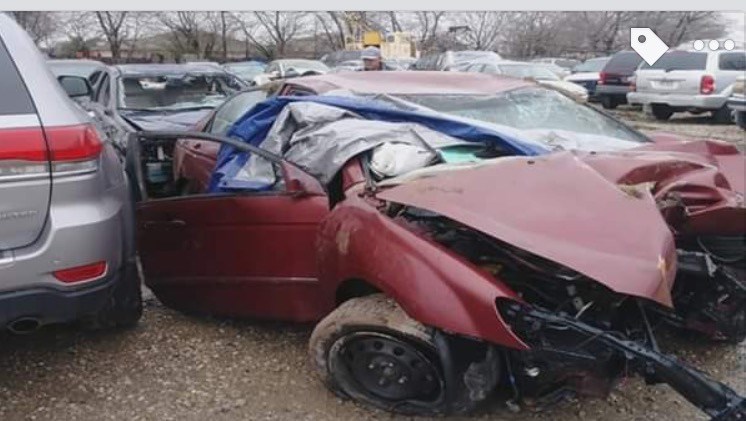
As graduation ceremonies are postponed or streamed online, DJ's friends are posting photos and tributes to him on Tarver's Facebook page. One May 14 post stood out as a testament to how much DJ was loved by his peers:
“There has been a red cardinal outside of my apartment everyday. I’ve been going through a lot in my life and I feel like that was Dj sending me a sign of hope. Probably sounds insane but I haven’t been able to get Dj off of my mind. He was such a genuine and kind person and you should be so proud of the lives he touched here on earth.”
His son’s death could have been prevented, Tarver says, if officers had reacted properly with the same kind of patience and compassion Darius showed to others.
Body cam footage shows officers improperly using deadly force on his son who was in crisis after a traumatic brain injury, says Tarver, who serves on the police chief’s advisory council. He says he has gone through Crisis Intervention Training where he learned ways to recognize and react to a person in a mental crisis.
“Barking out rapid commands only makes things worse,” he says.
Tarver says the video depicts a very distraught young man muttering to himself and citing Scripture. No where in the footage, he says, does he see him attack or stab an officer.
“I’m pro-police but I am for justice,” he says. “My son was the one being attacked.”
For the same reason his son was wearing sunglasses after first leaving the hospital, Tarver says he believes his son was knocking out lights because his head injury made his eyes sensitive.
Tarver also points out that in the video, officers were yelling commands before attacking his son, which is something proper training says not to do when dealing with someone in a mental crisis. “There was no de-escalation by taking the time to talk with him,” he says. “A 9-1-1 call is not supposed to be a death sentence if there is proper training.”
It’s unclear what kind of mental health crisis training is available to Denton police. Denton Police Chief Frank Dixon said officers responded appropriately when DJ failed to follow verbal orders. Dixon defended his officers during a press conference in early March, saying they acted professionally. He said all his officers receive training in crisis intervention.
Sadly, it’s not a surprise that all police don’t respond more calmly to someone experiencing a mental health crisis. People with untreated mental illness are 16 times more likely to be killed by police, the Treatment Advocacy Center found in a Dec. 2015 report “Overlooked in the Undercounted: The Role of Mental Illness in Fatal Law Enforcement Encounters.”
Police departments across the country are grappling with how to manage the responsibility of officers who are increasingly the first ones on the scene of psychiatric emergencies. Some departments are hiring psychiatrists and social workers on their staffs. Others have formed teams of officers especially trained in crisis intervention.
Law enforcement officials should be familiar with signs and symptoms of mental illness or a person in crisis, according to the International Association of Chiefs of Police (IACP) Law Enforcement Policy Center, which offers several other steps to calm the situation. This may include eliminating emergency lights and sirens, assuming a nonthreatening manner, and moving slowly.
Over 47 million adults and 7.7 million children deal with some form of mental illness yearly studies show.
“We have a crisis in policing,” Tarver wrote in a recent Facebook post. “No family should ever have to experience such a violent death of a loved one especially by those sworn to protect. I will commit myself in honor of my son to help change certain legislation, laws and procedures in our criminal justice system. I totally support Law Enforcement, pray for them daily and stand right beside them when they are just, but I will always stand against any injustice whether by civilian(s) or law enforcement.”
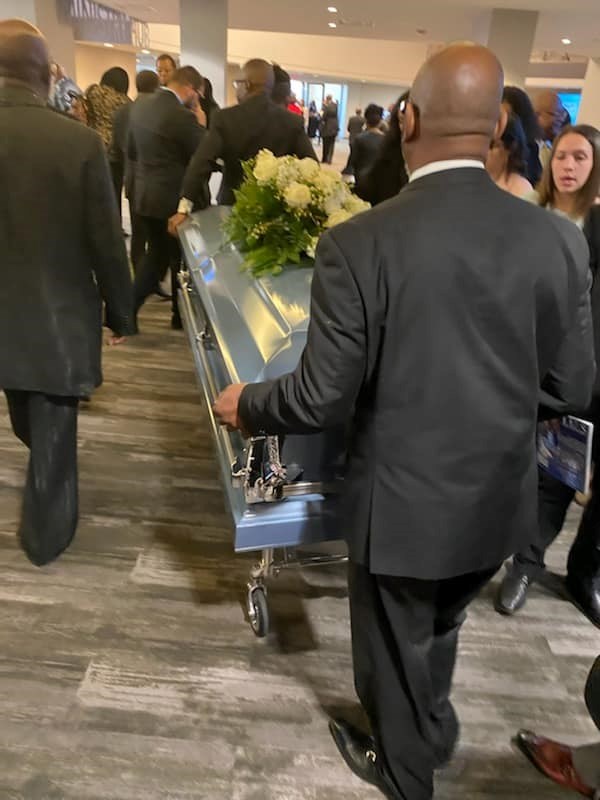
The last few months have been particularly difficult on Tarver. He keeps a special invitation in his desk drawer at his home in McKinney. It’s from UNT, inviting the Tarver family to an award ceremony honoring DJ.
He opens it and begins to read: “Congratulations to all the Graduates of 2020.”
His voice cracks. He stops.
He is unable to finish reading the letter that lists the accomplishments of his son, including a scholarship established in his name by UNT’s chapter of the National Organization of Black Law Enforcement (NOBLE), of which Darius was a member. A reception was planned for April but canceled by the lockdown.
DJ was being awarded his diploma posthumously.
“We would’ve been packed screaming his name as he walked across the stage but today, he is standing on a greater stage than all of us,” his father says.
He thinks about the future his son had ahead of him and how he was saved from death in the car accident for a reason in the weeks leading up to the shooting. It gave him a little more time to be with his son and he will forever cherish those last few moments.
The actions by officers, Tarver says, robbed his son of his life and his plans, which was to work for justice in the very field that failed to protect him. He is still waiting on the grand jury's decision.
“I will continue to fight for what my son stood for,” he says. “I will fight to make sure my son's death will not be in vain.”

